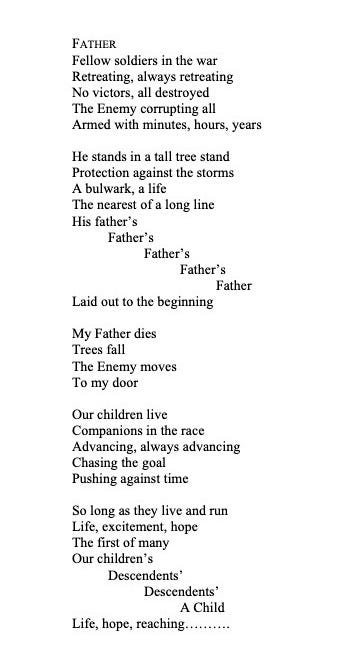I’m happy that my friend and former colleague, Raymond Williams, has offered to publish another guest post. His first one touched many, and I’m confident this one will too. You can read more about him in the note below.[i]
I have written only one poem, and it was deeply personal. The occasion was in 1973 when I was a Visiting Scholar at Cambridge University. I received word from my family that my father had died. I could not return to the United States in time to attend the funeral. My grief and mourning focused on writing this poem, which has not been shared outside the family until now.
In Memoriam
James Madison Williams
1901-1973
The emotion and power of the imagery from over fifty years ago emerge from cultural ideas fixed in time through which I have lived. It was a stable, somewhat idealized portrayal in which nuclear families lived, and extended families, including grandparents, interacted regularly with relatives. In our case, my father’s father and an extended network of grandfathers reached through varied American experiences back across the ocean to European cities and far beyond into the mists of time.
Times and cultural circumstances have changed which cause me to doubt whether the imagery from the poem is any longer relevant or powerful. Doesn’t the imagery depend upon culturally imposed norms that are now shredded and no longer relevant? Indeed, it might well create controversy. It might well be deemed to be a patriarchal, sexist, homophobic, restrictive mirage fading into a receding mist of time.
What about my mother and other mothers? Could not poems be written about them? Mothers are primary protectors of children, at least in an idealized portrayal. Could I write a poem about MOTHER in our current cultural climate? Fortunately, I was back home when my mother died, so I could share my grieving with my siblings and other relatives.
Family seems no longer a coherent image in our individualistic culture. A more mobile population scatters families so children grow up not knowing anything about earlier generations. Many children are born in families without a partner to be named as co-parent. Biological and cultural parenthood are uncoupled. Unfortunately, many children are abused, unprotected, by adult caregivers with whom they reside for a time. For many, no line of generations exists, certainly not a stately line.
I ponder these issues now because I am the eldest of my generation, an old tree that will soon fall. How will our children and those who follow interpret the experience? Who knows? Probably not in terms of the passing of generations.
When a tree falls in a forest and no one notices it, what happened? An age-old philosophical question posed by George Berkeley!
[i] Raymond Brady Williams, Ph.D. (University of Chicago), has enjoyed a long retirement since 2002 after serving as Professor of Religion at Wabash College. He was also Founding Director of the Wabash Center for Teaching and Learning in Theology and Religion and of the Wabash Pastoral Leadership Program. He is the author of several books on a wide range of topics, including the religions of India, immigrants from India and Pakistan, and teaching religion. Nearing 90 years of age, he and his wife, Lois, live near the Wabash College campus.





